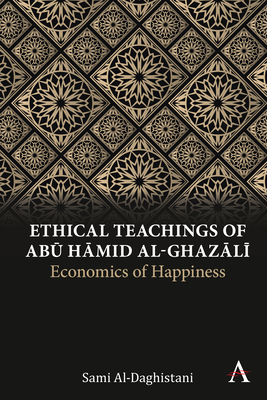Ethical Teachings of Abū Ḥāmid Al-Ghazālī: Economics of Happiness

Ethical Teachings of Abū Ḥāmid Al-Ghazālī: Economics of Happiness
Al-Ghazālī made seminal contributions to the field of ethical economic thought. Though he dedicated many chapters in his encyclopaedic Iḥyā' Ulūm al-Dīn (The Revival of Religious Sciences) to what he considered just and Sharī'a-based economic conduct in (Muslim) society, this specific aspect of his corpus has been largely overlooked in Western scholarship. This book aims to analyse and revive al-Ghazālī's little studied economic teachings by emphasizing his economic philosophy and its correlation between Sharī'a's moral law and the tradition of taṣawwuf, situating his thought within the context of modern economic theories.
The scholarly ignorance of his economic contributions goes hand in hand with a claim made by several Western scholars (e.g., J. Schumpeter) that classical Islamic scholarship did not offer any significant development in the domain of economic thought in what was known in Europe as the Middle Ages--a claim that scholars like Ghazanfar and Islahi, attempted to refute. This book delves into an analysis of al-Ghazālī's theoretical accounts and his economic philosophy as part of his overall ethics of happiness, looking closely at select passages from his work in order to position them at the intersection of two domains within the framework of classical Islamic economic thought, namely taṣawwuf or Sufi-mystical thought and Sharī'a law.
This work does not assume that al-Ghazālī anticipated modern trends of Western economics; however, by merging the necessity of kasb (acquisitions of wealth) and the importance of zuhd (renunciation of the worldly endeavours) as equal components in the context of the science of the hereafer ('ilm ṭarīq al-ākhira), he presented the culmination of ethical economic thought in classical Islamic tradition, influencing later Muslim scholars. Hence, in this rather specific reading of al-Ghazālī's economic philosophy, he conceived of an economic analysis that was founded upon ethical teachings, an endeavor that should be ultimately regarded as a technology of self-examination.
PRP: 343.58 Lei
Acesta este Pretul Recomandat de Producator. Pretul de vanzare al produsului este afisat mai jos.
309.22Lei
309.22Lei
343.58 LeiLivrare in 2-4 saptamani
Descrierea produsului
Al-Ghazālī made seminal contributions to the field of ethical economic thought. Though he dedicated many chapters in his encyclopaedic Iḥyā' Ulūm al-Dīn (The Revival of Religious Sciences) to what he considered just and Sharī'a-based economic conduct in (Muslim) society, this specific aspect of his corpus has been largely overlooked in Western scholarship. This book aims to analyse and revive al-Ghazālī's little studied economic teachings by emphasizing his economic philosophy and its correlation between Sharī'a's moral law and the tradition of taṣawwuf, situating his thought within the context of modern economic theories.
The scholarly ignorance of his economic contributions goes hand in hand with a claim made by several Western scholars (e.g., J. Schumpeter) that classical Islamic scholarship did not offer any significant development in the domain of economic thought in what was known in Europe as the Middle Ages--a claim that scholars like Ghazanfar and Islahi, attempted to refute. This book delves into an analysis of al-Ghazālī's theoretical accounts and his economic philosophy as part of his overall ethics of happiness, looking closely at select passages from his work in order to position them at the intersection of two domains within the framework of classical Islamic economic thought, namely taṣawwuf or Sufi-mystical thought and Sharī'a law.
This work does not assume that al-Ghazālī anticipated modern trends of Western economics; however, by merging the necessity of kasb (acquisitions of wealth) and the importance of zuhd (renunciation of the worldly endeavours) as equal components in the context of the science of the hereafer ('ilm ṭarīq al-ākhira), he presented the culmination of ethical economic thought in classical Islamic tradition, influencing later Muslim scholars. Hence, in this rather specific reading of al-Ghazālī's economic philosophy, he conceived of an economic analysis that was founded upon ethical teachings, an endeavor that should be ultimately regarded as a technology of self-examination.
Detaliile produsului









